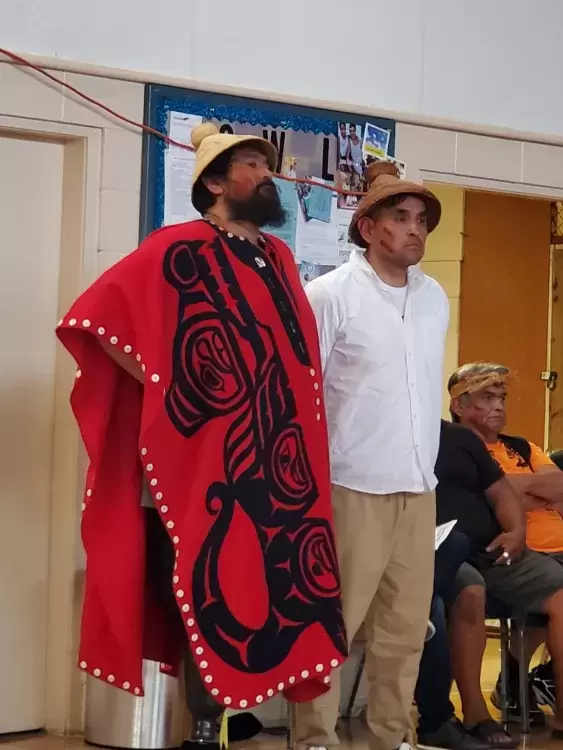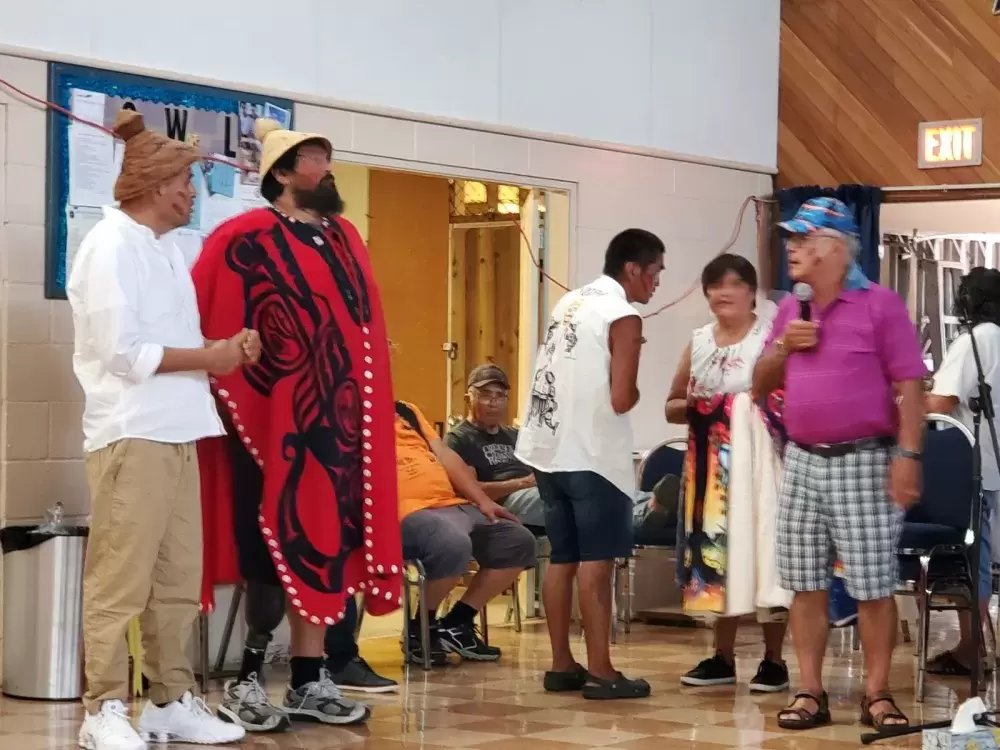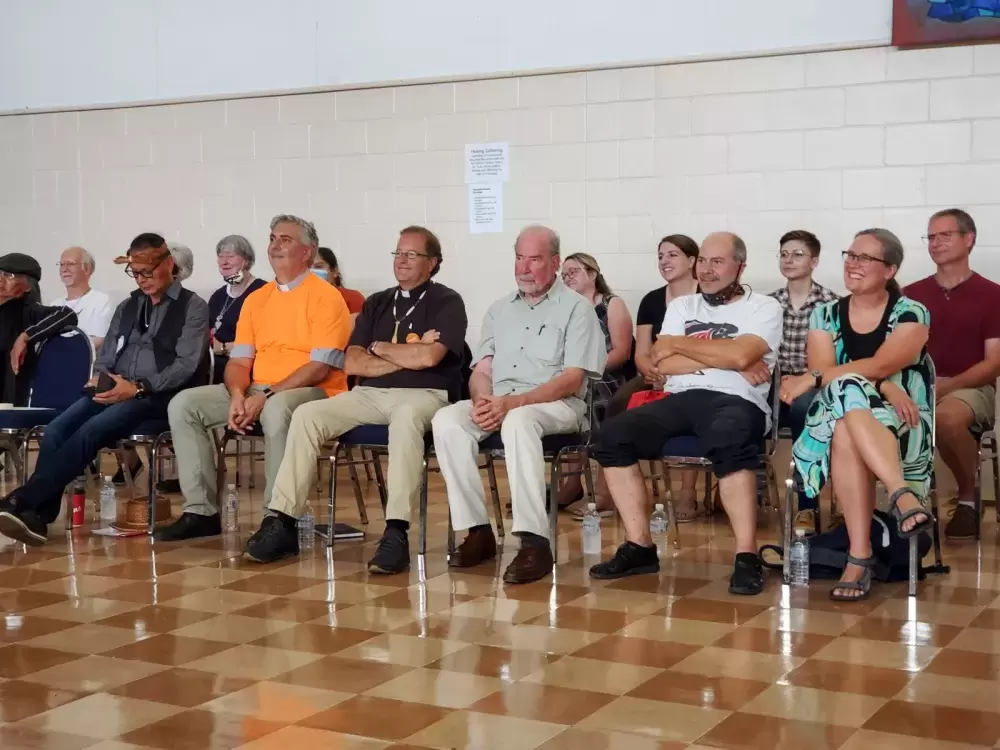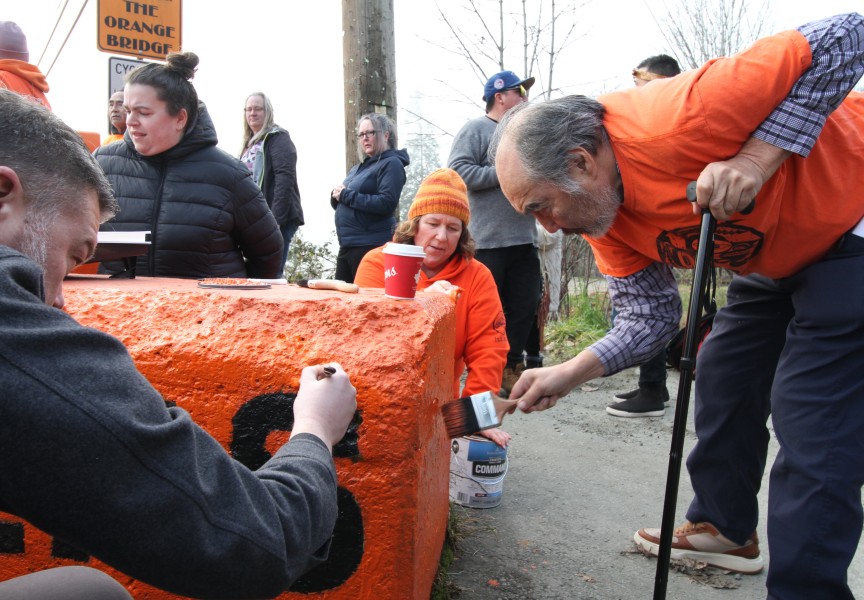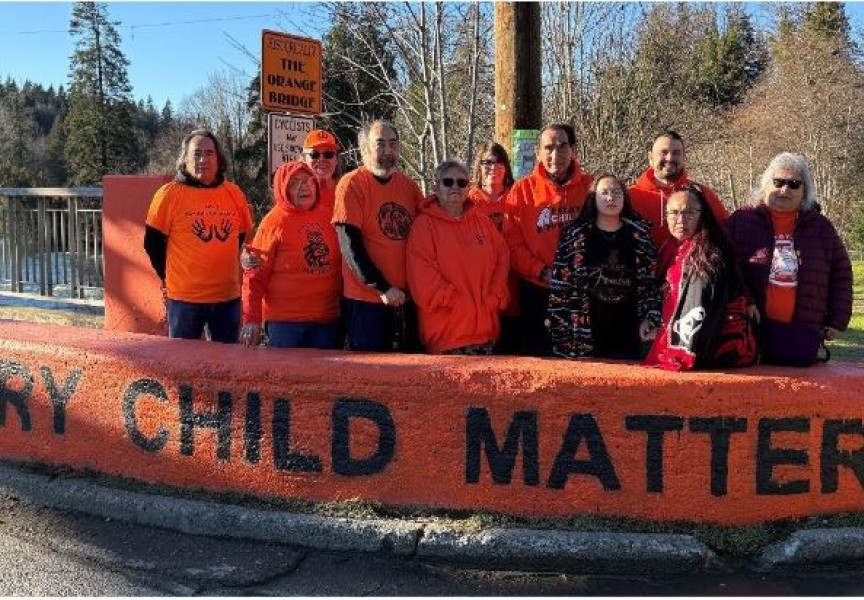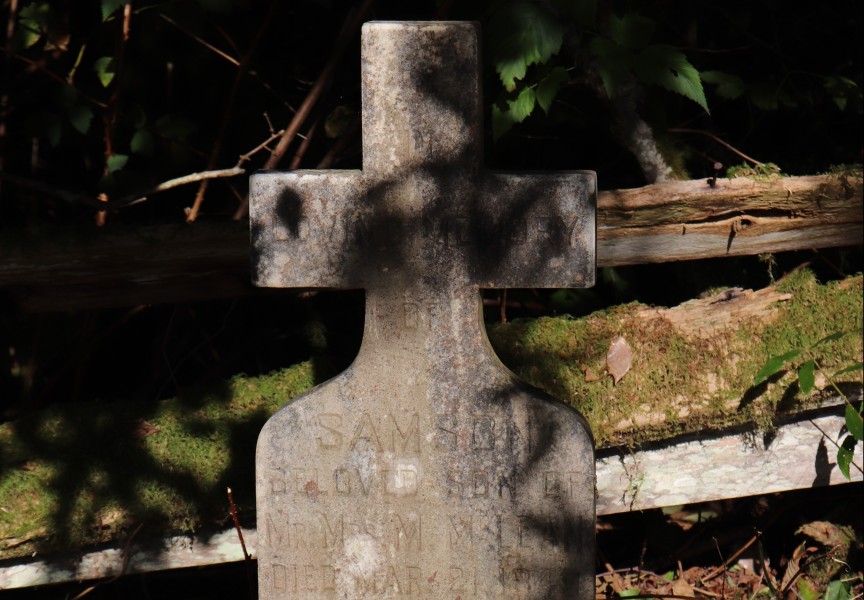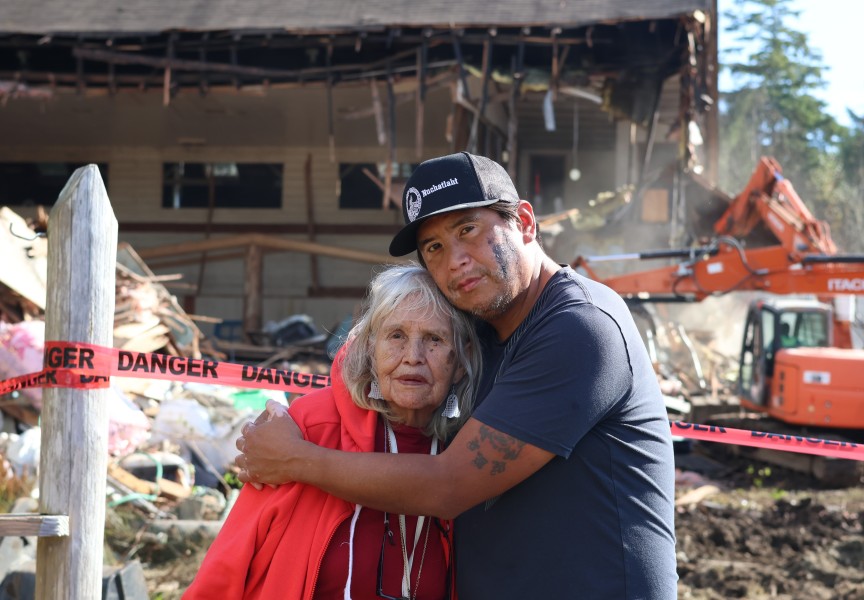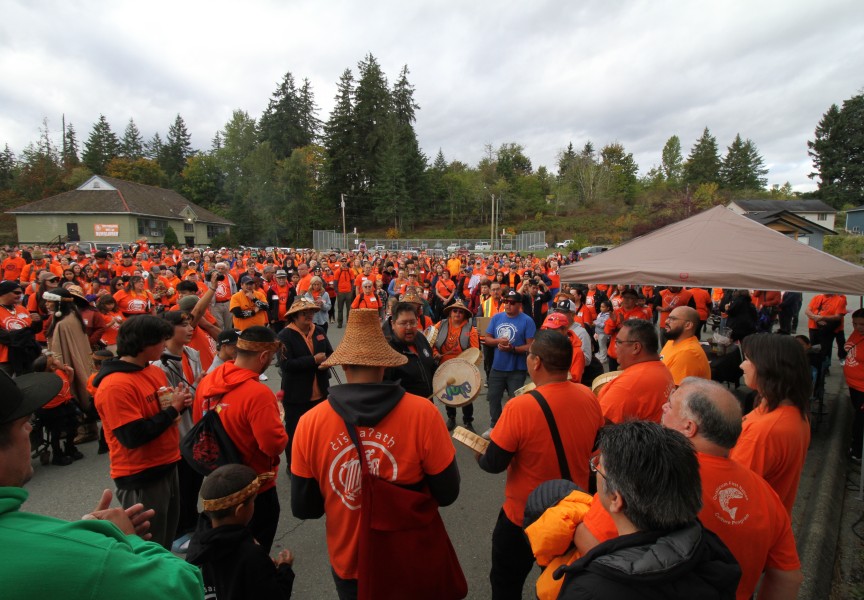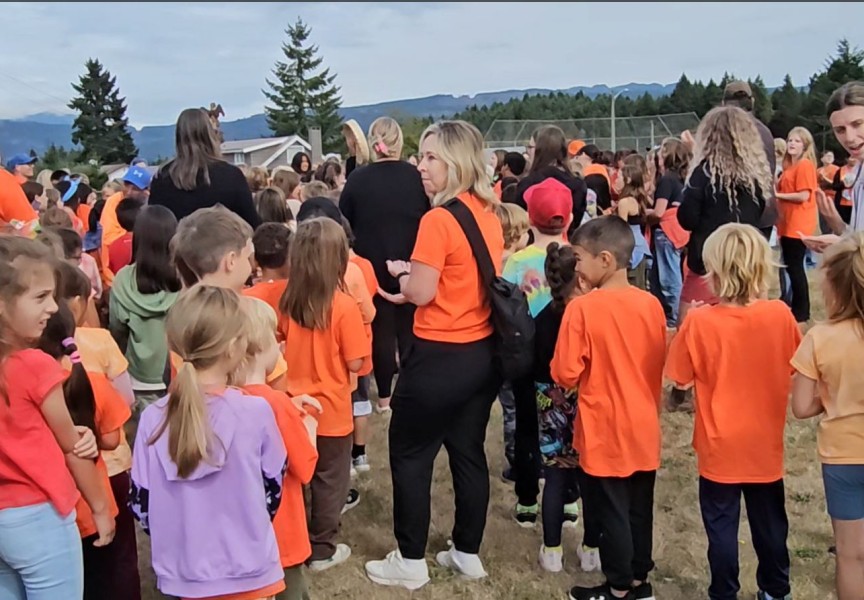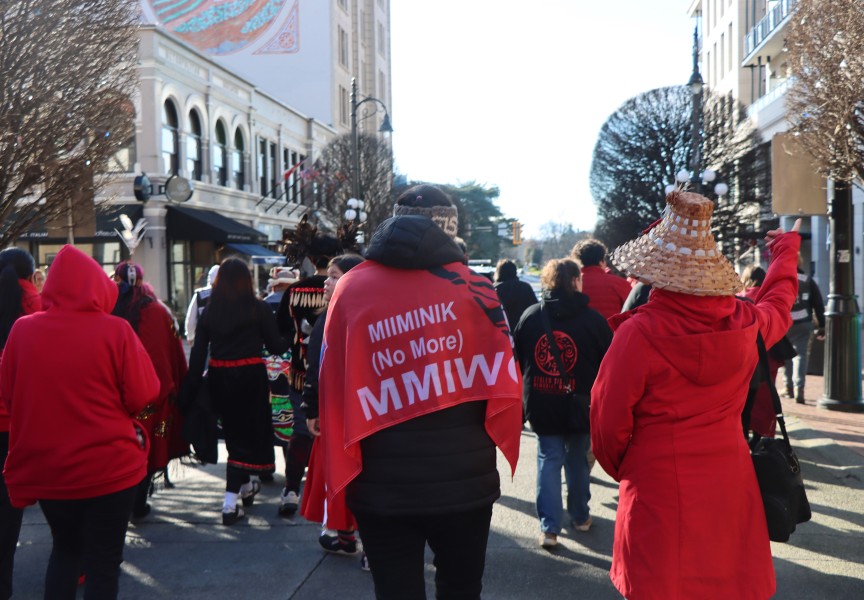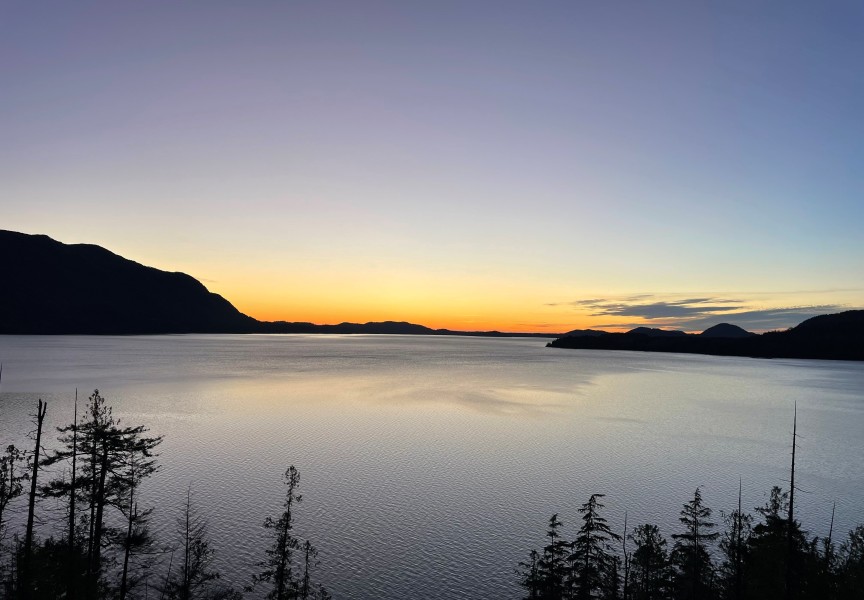A group of Ahousaht members hosted a gathering at Our Lady of the Rosary Catholic Church Hall Sunday on Aug. 15. The purpose was to cement the friendship between the church and the Victoria-based Ahousaht members.
The Ahousaht cultural group formed in Victoria several years ago. Made up of singers and dancers, the group gathers in Langford at a hall owned by Our Lady of the Rosary Catholic Church where they socialize and practice cultural songs and dances. Their cultural nights are open to all Indigenous people that wish to take part. Members of Esquimalt First Nation regularly take part in the fun evenings.
In his notification of the event, organizer and Ahousaht Councillor Phillip Guy Louie invited people to join the group as they step onward to embrace reconciliation, truth and friendship with the Victoria Catholic Church.
Louie told the crowd that regular culture nights have been on hold since gatherings were restricted in 2020 due to the COVID-19 pandemic, but with restrictions lifting, they plan the evening events at the church property, which they’ve been using for many years.
For this reason, it was important to acknowledge news stories of the human remains found buried in unmarked graves on former residential school grounds and the feelings being stirred up across Canada.
Leaders of the Ahousaht cultural group met with Father Dean and other church officials to work on a way to move forward.
Elected chief Greg Louie thanked Father Dean, saying that the people were gathered there because Father Dean extended a hand.
Louie noted that not everyone is ready for this form of reconciliation. He stated that Father Dean has maintained close relationships with many Ahousaht members. He thanked Father Dean stating he didn’t just extend a hand but extended a heart.
“Our culture is still here because we are strong, resilient people,” said Louie. “We’re not going anywhere and you’re (non-Indigenous) not going anywhere so let’s walk together.”
The event started with a cleansing ceremony that covered the church buildings.
Inside the hall invited guests from Indigenous communities and the church congregation intermingled. Many people from both groups were wearing orange shirts.
Ahousaht Ha’wiih Hasheukmis (Richard George, standing in for his father Maquinna, Lewis George) and Hanuquii (Nate Charlie) and speaker Cliff Atleo announced that the first order of business was to comfort those grieving for lost family members. Ta’ilthma, as it is called, is an offering of support for the people, to recognize their grief and to show them that their presence at the event is appreciated, Atleo explained.
Atleo carefully explained things as the event carried on, so that those unfamiliar with Nuu-chah-nulth ways could understand what was going on and why it was being done.
He told the crowd that the act of blanketing people symbolizes healing energy being offered to strengthen them and to hold them up during difficult times.
After being blanketed, the Ahousaht delegation performed a dance called the Yaht-yahta. Atleo explained that the name of the dance, literally, means to walk.
“It’s to make those that are grieving feel better,” he shared. “It’s telling them that your people, your chiefs, want to hold you up because they know grief is not easy.”
Former residential school students were asked to come forward and they, too, were blanketed. Phillip Guy Louie Sr. said it was important for Ahousaht Ha’wiih to recognize survivors and they had arranged brushings for anyone who wanted it.
Hanuquii spoke to his mother Genevieve, who was seated with the other residential school survivors.
“If you didn’t survive, mom, I wouldn’t be here,” he said before thanking her. He told he was there now, to hold her up.
Church representatives including Father Dean were asked to stand before the crowd. He told them that he, the church officials and congregation came there with a profound sense of honor.
“We respect that you would have us here to express your solidarity with our friends,” he told the people. “I am so sorry for your losses, and I will walk with you if you will have me.”
As he spoke of a greater power, Father Dean used words like Noss (a Nuu-chah-nulth word for Creator) and Creator.
Father Dean said he has spoken to Indian residential school survivors and has offered what support he can. Some, he said, just wanted a hug.
“We see you care for each other, and we learn from you,” he told the people.
At one point, the Ahousaht Ha’wiih along with Cliff Atleo stood before the church guests. Speaking on their behalf, Tim Sutherland invited a man to sit on a chair placed in the middle of the floor. He told the man to select two people that would act as his parents.
A man and woman stepped forward as Sutherland told the first man that he is a little boy and the Ahousaht Chiefs were there to take him away from his parents to Ahousaht. He will no longer be allowed to speak English and if he tries to run away, well, there were three strong Ahousaht men there that would stop him.
The moment was profound as the woman started to cry, while the ‘father’ and the ‘boy’ both dabbed at their tears.
The demonstration ended in hugs.
Dave Frank talked about his experience in residential school.
“I was sexually abused by a priest,” he shared.
As an adult, the long-term effects of the assault left him suicidal, and he talked about his third and final attempt to commit suicide. He was getting his weapon ready when there was a persistent knocking at his door. There, at his door stood a priest.
“It was a priest that God sent to rescue me,” he said.
From that day forward, Frank committed to let go of his pain and anger.
“It wasn’t the whole church that hurt me, it was an individual,” he said.
Frank then assisted in a brushing ceremony that the church congregation willingly took part in.
Father Dean went on to say that they recognize the intergenerational trauma of Indian residential schools and how it impacts the children and grandchildren of survivors.
“We can’t comprehend our children being taken from us and not speaking their language – all we can do is walk with you,” he said. “We stand with you in solidarity; we are sorry for the losses you continue to endure. We’re sorry and we will do better.”
There were two residential schools in Ahousaht and two churches. None of the buildings exist any longer.
Church officials standing with Father Dean traveled to take part in the event. There were pastors from several Catholic churches in the Victoria area and one from Port Alberni. Bishop Gary Gordon was also in attendance.
Father Dean recalled the time that the Swan family needed a place to gather when elder Rosie Swan passed away in a Victoria hospital. He was able to connect with another church who opened their facility for the family.
“We will share with you…you’re our people too and you are welcome to our churches,” he said.
Elected Chief Louie says Ahousaht First Nation is in talks with both Catholic and United Church officials about reconciliation measures.
The evening was rounded out with dinner and cultural performances.

